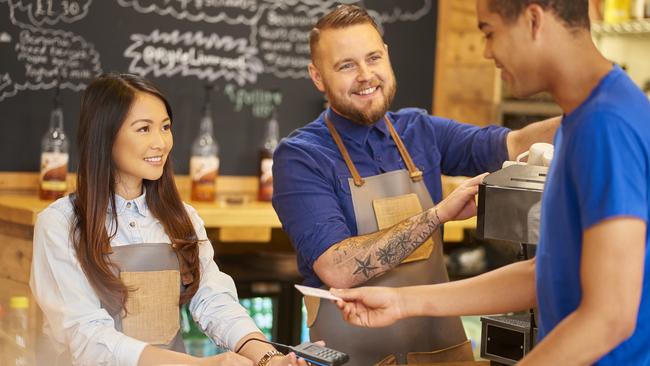Reserve Bank of Australia warns shops not to gouge customers as contactless payments rise
One of Australia’s top bankers has said customers must still have a way to avoid sneaky card fees and they cannot be trapped into paying debit and credit charges.
Coronavirus
Don't miss out on the headlines from Coronavirus. Followed categories will be added to My News.
Exclusive: Shops which refuse to take cash have been ordered to ensure customers still have a way to avoid sneaky card fees.
The Reserve Bank has laid down the law with a top executive declaring shoppers can’t be trapped into paying debit and credit surcharges.
It comes amid a dramatic drop in the use of cash amid fears it could spread coronavirus.
Reserve Bank of Australia’s head of payments Tony Richards told News Corp businesses are free to choose whatever payments they wish however, at least one surcharge-free option must remain available.
“Merchants have to accept some form of payment that is not surcharged – they can’t surcharge all payment methods,” he said.
“Paying by cash is generally the way to avoid the surcharge.”

New RBA statistics show the amount of cash withdrawn from ATMs nationally in March fell by a whopping 10 per cent to $9.06 billion.
This is the lowest level of cash withdrawn in 19 years.
Some retailers charge customers as much as 1.75 per cent extra on every transaction – the equivalent of 7c for a $4 cup of coffee or 44c for a $25 takeaway meal.
Mastercard lowered the amount it charges retailers to use their service last year from 12.5c a transaction to 4c.
While rival scheme Visa also reduced charges in 2019 from 8c a transaction to 5c.
Last month the nation’s payment industry the Australian Payments Network announced the temporary increase to the limit of contactless payments from $100 to $200 in a reduce to the use of cash during the COVID-19 pandemic.

MORE NEWS
ATO warns super rorters: Lie and face hefty penalties
ATO’s warning to Aussies making racy quick cash
Super withdrawals frozen as hacking fallout revealed
Mum stripped of $10K from super
This was done to stop the potential spread of disease using notes and coins.
Mr Richards said the downward trend of cash usage would likely continue post-COVID.
“We expect that many of those who prefer to use cash will go back to using cash but some people may find they are happy to continue using their card more often,” he said.
“There has been a gradual fall in cash usage over a long period and COVID-19 may result in a further step downwards.”
AusPayNet’s chief executive officer Andy White said “cash continues to be preferred by some consumers and is a good fallback mechanism that will continue to be used”.
“There needs to be a fee-free method of payment but that doesn’t need to be cash,” he said.
Mr White said this could be for example be the ability to use a debit card without incurring extra charges.
The Commonwealth Bank’s chief executive officer Matt Comyn said cash usage would remain prevalent in Australia for some time yet.
“There is no doubt that digital payments will continue to grow and therefore the use of cash will continue to drop,” he said.
“That said cash will continue to play an important role in the lives of many of our customers in the years to come so we don’t see Australia becoming a solely cashless economy anytime soon.”

